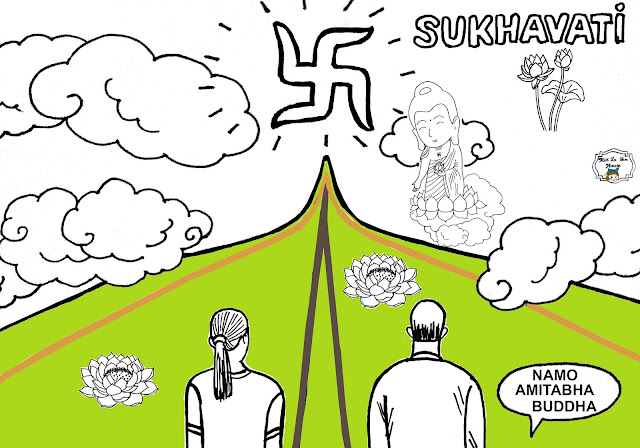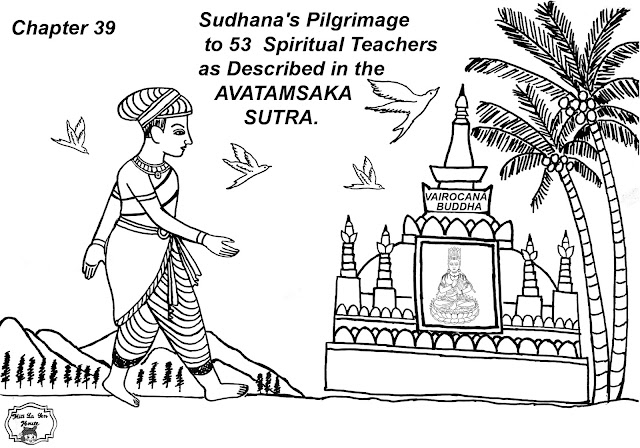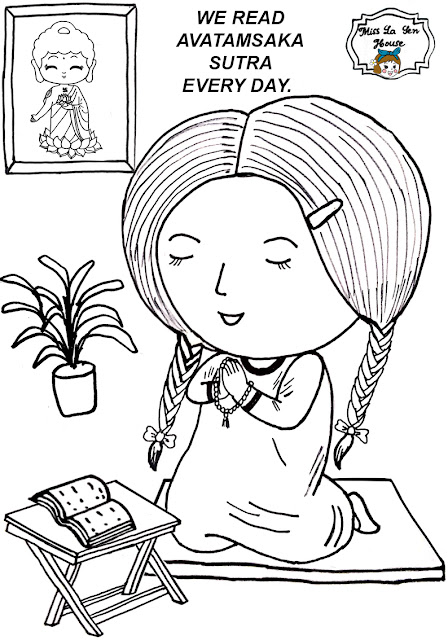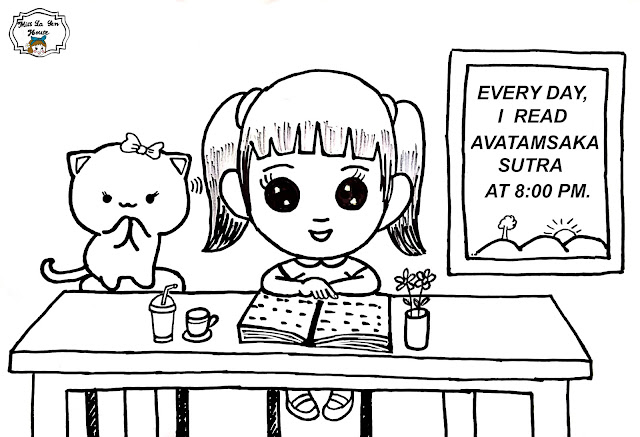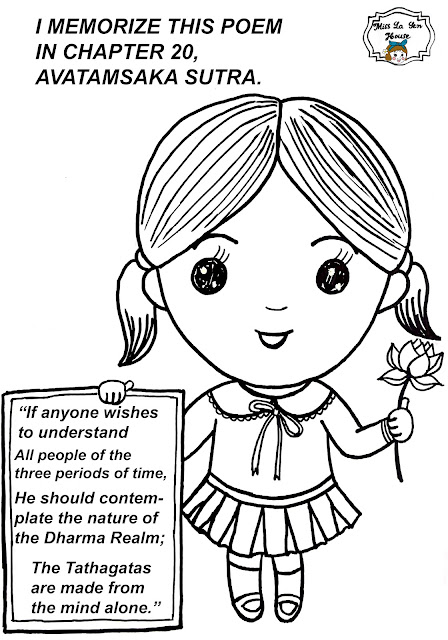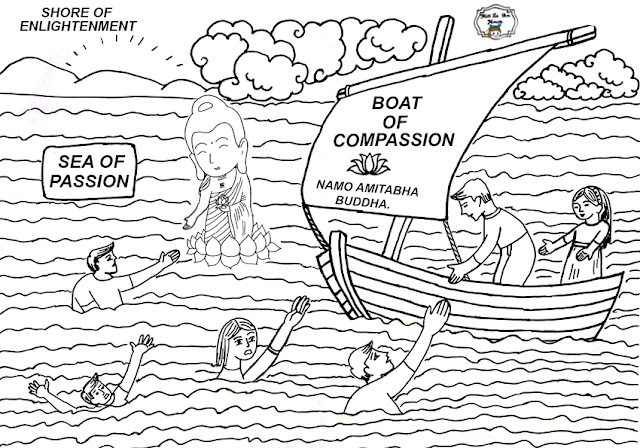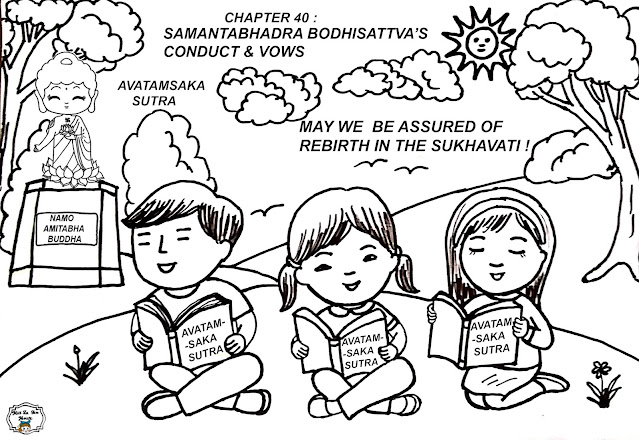Thứ Ba, 31 tháng 5, 2022
Thứ Bảy, 28 tháng 5, 2022
We are like lost infants. Amitabha Buddha is like our compassionate mother who always protects us
We are like lost infants. Amitabha Buddha is like our compassionate mother who always protects us !
Chủ Nhật, 22 tháng 5, 2022
May all VISIBLE AND INVISIBLE SENTIENT BEINGS that I have caused their sufferings
~DEDICATE THE MERITS:
---
“Due to all the merits of reciting AVATAMSAKA sutra, bowing to
Buddha, reciting Buddha’s name, reciting Surangama mantra, reading 10 vows of SAMANTABHADRA
bodhisattva and reading the repentance “EMPEROR LIANG JEWELED REPENTANCE”,
creating the Buddha photos...
***May all VISIBLE AND INVISIBLE SENTIENT BEINGS that I have
caused their sufferings, hurt be
instantly LIBERATED FROM THEIR SUFFERINGS AND REBORN IN THE SUKHAVATI.
-May the BODHICITTA that is already generated be increased
forever more.
---
We dedicate the merit of our practice today to the benefit of all invisible and visible sentient beings.
May all VISIBLE AND INVISIBLE SENTIENT BEINGS that I have
caused their sufferings, hurt be instantly LIBERATED FROM THEIR SUFFERINGS
AND REBORN IN THE SUKHAVATI.
RECITING THE BUDDHA'S NAME ONCE CAN DIMINISH ONE'S BAD KARMA
“RECITING THE BUDDHA'S
NAME ONCE
CAN DIMINISH ONE'S BAD
KARMA,
AND BOWING TO THE
BUDDHA
CAN INCREASE ONE'S
GOOD KARMA.”
-- A Buddhist saying--
Thứ Năm, 19 tháng 5, 2022
Thứ Tư, 18 tháng 5, 2022
Thứ Hai, 16 tháng 5, 2022
AVATAMSAKA SUTRA, a verse says
In the AVATAMSAKA SUTRA, a verse says:
Thứ Ba, 10 tháng 5, 2022
amitabha buddha- MAY WE BE ASSURED OF REBIRTH IN SUKHAVATI
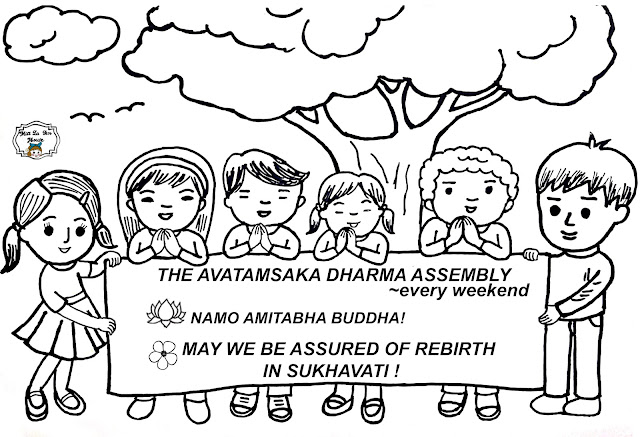 |
The supreme and endless blessings of Samantabhadra’s deeds,
I now universally transfer.
May every living being, drowning and adrift,
Soon return to the Land of Limitless Light!
(The Vows of Samantabhadra)
---
Vairocana is often
interpreted, in texts like the AVATAMSAKA SUTRA, as the dharmakāya of the
historical Gautama Buddha.
If anyone wishes to understand
All people of the three periods of time,He should contemplate the nature of the Dharma Realm;
The Tathagatas are made from the mind alone.
Commentary:
If anyone wishes to understand. Suppose there are people who wish to understand how people become people.
All people of the three periods of time. "Shouldn't it be 'all Buddhas of the three periods of time'? Why did you say 'all people of the three periods of time'?" you ask. People are Buddhas. If you call a person a Buddha, that's okay; and if you call the Buddha a person, that's okay, too. Why is this? Because a person can become a Buddha. A Buddha is just a person who has realized Buddhahood. If you talk about Buddhas, no one really understands. "What's a Buddha?" they ask. Everyone knows what a person is. So we'll talk about people, and it will become easier to understand.
Who are the people we're discussing? The Buddhas.
"Am I a Buddha?" you ask.
You are.
"Are other people Buddhas?"
Yes, they are too. You are a Buddha, but an unrealized Buddha. After your realization, you will become a true Buddha. Now you are a false Buddha. False Buddhas can become true Buddhas, and true Buddhas can become false Buddhas. If anyone wishes to understand / All Buddhas of the three periods of time. The verse starts with the word "if" to indicate that this is only a hypothetical situation; don't be attached and think that it's real. The Buddhas of the three periods of time are just people who have realized Buddhahood.
Each living being in the Dharma Realm has its own nature. Pigs have the nature of pigs; horses have the nature of horses. Men have the nature of men, and women have the nature of women. Each has his or her own nature. Those who like to eat sweet things have a sweet nature; those who like to eat sour things have a sour nature; those who like hot, spicy things have a hot nature. Those who like to eat bitter things have a bitter nature, like all of us here. [Note: In Chinese, the same character means both 'bitter' and 'ascetic.'] We cultivate ascetic practices. Cultivation is ascetic practice; even going to the dining hall to eat is an ascetic practice. When it comes to ascetic practices, none of you should fall behind. You should race toward the front. In the "ascetic practice" of eating, all of you race toward the front, don't you?
If you look into it, you'll find that everything has its own nature. Trees have the nature of trees; flowers have the nature of flowers; grass has the nature of grass. Each thing has its own nature. So "the nature of the Dharma Realm" refers to the nature of each living being in the Dharma Realm. Do you understand? Previously you thought that the Dharma Realm had a nature, but now you know this is referring to the nature of living beings in the Dharma Realm.
The Tathagatas are made from the mind alone. The original verse from the Avatamsaka Sutra said: If anyone wishes to understand / All Buddhas of the three periods of time, / He should contemplate the nature of the Dharma Realm; / Everything is made from the mind alone. I changed the second line to say, All people of the three periods of time, and I also changed the last line to The Tathagatas are made from the mind alone. Buddhas are created from the mind. If your mind cultivates the Buddhadharma, you will become a Buddha. If your mind likes the Bodhisattvas, you can practice the Bodhisattva Way and become a Bodhisattva. If your mind wants to fall into the hells, you are bound to fall
.
Thứ Bảy, 7 tháng 5, 2022
Sudhana- Good Wealth, AVATAMSAKA SUTRA
AVATAMSAKA SUTRA
Gandavyuha Sutra, List of 53 Teachers of SUDHANA
The GANDAVYUHA, often referred to as an independent sutra,
is the last chapter of the larger AVATAMSAKA SUTRA.
-Manjushri, Male, bodhisattva
Sudhana, Male, boy
THE FIFTY-THREE TEACHERS:
1. Meghashri, Male, monk,
2. Sagaramegha, Male, monk, Sagaramukha
3. Supratishthita, Male, monk, Lanka
4. Megha, Male, grammarian, Vajrapura,
5. Muktaka, Male, meditation community, Vanavasin
6. Saradhvaja, Male, monk,
7. Asha, Female, lay devotee, Samudravetali,
8. Bhishmottaranirghosha, Male, seer, Nalayur
9. Jayoshmayatana, Male, brahmin, Jayoshmayatana
10. Maitrayani, Female, girl, Simhavijurmbhita
11. Sudarshana, Male, mendicant, Trinayan
12. Indriyeshvara, Male, boy, Sumukha
13. Prabhuta, Female, laywoman, Samudrapratishthana
14. Vidvan, Male, householder, Mahasambhava
15. Ratnachuda, Male, householder, Simhapota
16. Samantanetra, Male, perfumer, Vetramulaka
17. Anala, Male, King, Taladhvaja
18. Mahaprabha, Male, King, Suprabha,
19. Achala, Female, Sthira
20. Sarvagamin, Male, mendicant, Tosala
21. Utpalabhuti, Male, perfumer, Prthurashtra
22. Vaira, Male, mariner, Kutagara
23. Jayottama, Male, city elder, Nandihara,
24. Sinhavijurmbhita, Female, Nun, Kalingavana
25. Vasumitra, Female, lay woman, Durga Land,
26. Veshthila, Male, householder, Shubhaparmgama
27. Avalokiteshvara, Male, bodhisattva
28. Ananyagamin, Male, universal traveller
29. Mahadeva, Male, deva
30. Sthavara, Female, Earth Goddess
31. Vasanti, Female, Night Goddess, Kapilavastu
32. Samantagambhira Shrivimalaprabha, Female, Night Goddess,
33. Pramuditanayana Jagadvirocana, Female, Night Goddess,
34. Samantasattvatranojahshri, Female, Night Goddess,
35. Prashantarutasagaravati, Female, Night Goddess,
36. Sarvanagararakshasambhavatejahshri, Female, Night
Goddess,
37. Sarvavrikshapraphullanasukhasamvasa, Female, Night
Goddess,
38. Sarvajagadrakshapranidhanaviryaprabha, Female, Night
Goddess,
39. Sutejomandalaratishri, Female, Night Goddess, Lumbini
40. Gopa, Female, girl, Kapilavastu,
41. Maya, Female, mother of the Buddha,
42. Surendrabha, Female, Goddess, Thirty-three Heaven,
43. Vishvamitra, Male, Kapilavastu, teacher
44. Shilpabhijna, Male, Kapilavastu, (Letters)
45. Bhadrottama, Female, lay woman,
46. Muktasara, Male, goldsmith, Bharukaccha
47. Suchandra, Male, householder, Bharukaccha,
48. Ajitasena, Male, householder, Roruka
49. Shivaragra, Male, Brahmin, Dharma village
50. Shrisambhava & Shrimati, Male & Female, boy and
girl, Sumanamukha,
51. Maitreya, Male, bodhisattva
52. Manjushri, Male, bodhisattva
53. Samantabhadra, Male, bodhisattva
CHAPTER 39: “ENTERING THE DHARMA REALM”
Sudhana- Good Wealth




















